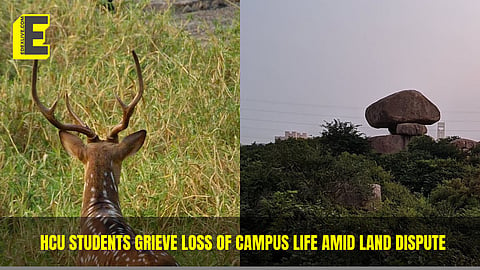

“We celebrated birthdays at Buffalo Lake. Watched sunrises from Mushroom Rock. Studied under trees and read books by the water. Now, it's all being taken away,” said Rajat, a student of the University of Hyderabad (UoH, also popularly known as Hyderabad Central University, HCU), referring to the destruction of nearly 400-acre of forest land in the Kancha Gachibowli area located near the university campus.
On the morning of March 30, as many as 30 to 40 excavators were deployed to clear the forested area near the university, despite continued student protests.
For most, it is a grave environmental issue. And while the ecological damage is undeniable, students say what they’re grieving is not just the loss of green cover.
For the students of HCU, the 400-acre stretch has always felt like a part of their campus life.
“The very tranquility of it, the greenery, the sound of peacocks and birds chirping — everything is part of the space we’ve inhabited for so long. Belonging to HCU meant belonging to that kind of an area,” said Rajat who is a master’s student at HCU.
Rajat came to HCU after completing his undergraduate degree at Delhi University (DU).
While DU might enjoy greater academic visibility, for him, the deciding factor was HCU’s campus — its openness, its quiet, its trees.
“There’s no pollution here. There’s space to study. We don’t restrict ourselves to the library or hostel rooms. We sit by the lakes, under trees, on rocks. That freedom to just be — that’s what makes this place so special,” added Khushi Jain, another HCU student.
More than just land
Mushroom Rock. Peacock Lake. Buffalo Lake.
These names carry deep meaning for HCU students. While for some, these spaces offer refuge from the pressures of academic life, for others, they are places to gather with friends.
These are landmarks passed down from one batch to the next. Mushroom Rock, for instance, is a massive, naturally balanced boulder formation located on the edge of the university. It's a popular spot for early morning treks, quiet conversations, and the occasional sunrise ritual.
“It was the last day of Semester One. I woke up at 4 am and we trekked up to Mushroom Rock. It was so cold, and there were police officers who told us the stretch is under court verification and we were going at our own risk. But we went anyway. We sat there. Watched the sunrise. It was beautiful.” Khushi recalled.
The memory is vivid and cherished, shared among every single student on campus. Peacock Lake holds a similar meaning. For students, it’s a stress-buster, a hangout spot, a picnic destination.
“We go there in groups. Sit on the rocks. Eat snacks. Sometimes I just walk silently. It’s one of those spaces where we don’t need a reason to go, we just do,” she added.
A future of concrete and noise?
The Congress-led Telangana government has indicated that the cleared land might be used to develop an Information Technology (IT) park or for real estate. Now that this forested land is under threat, students worry that the consequences might be irreversible.
“Right now, even in the summer, this campus feels cooler than the rest of Hyderabad. It’s because of the forest cover. If that land is gone, it’s going to get hotter, noisier, and more congested,” Khushi said.
And with the trees will go the animals. The peacocks, the deer, the birds.
“We wake up to birds chirping, to the sound of peacocks calling,” she continued and added, “It’s part of our mornings here. But if you clear the forest, where will they go? What will we wake up to then?”
While the government has assured that the proposed development will bring job opportunities for students and improved connectivity for the HCU campus, many students remain deeply concerned. They fear that such development will permanently alter the campus experience for future batches.
“Some departments, like Economics and Mathematics, have their buildings close to the proposed development site. Having an IT park right next to academic spaces is going to cause a lot of disruption. A central university like HCU needs to be in a calm, peaceful space, away from the chaos of urban life. That’s important for studying and focusing,” said Amritha, another master’s student.
“If this goes through, it’s not only going to affect us right now, but future batches too. With land shrinking, there won’t be any room left for expansion or for building new facilities. The traffic, the noise — it’s going to ruin the environment students need to learn and grow. This entire process feels rushed and completely dismissive of students’ voices,” she added.
“Education is not just classrooms”
The students repeatedly stressed that education at HCU has never been confined to classrooms. It happened during conversations at dusk, in study circles by the lake, and on solitary walks along rocky trails.
“You cannot remove one and say education will happen only in concrete spaces. It’s not just about the quality of public education. It’s about the aesthetics of it. The beauty of learning in a space that breathes,” said Rajat.
This is the loss students are mourning — not just deforestation, not just displacement, but the disintegration of a unique kind of campus life — one that nourished creativity, reflection, and community.
